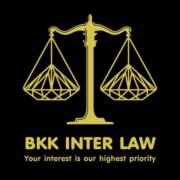Best Business Lawyers in Don Mueang
Share your needs with us, get contacted by law firms.
Free. Takes 2 min.
List of the best lawyers in Don Mueang, Thailand
Thailand Business Legal Questions answered by Lawyers
Browse our 13 legal questions about Business in Thailand and read the lawyer answers, or ask your own questions for free.
- What business categories are eligible for BOI promotion in Thailand?
- I run a manufacturing company which is registered in Thailand and we are interested in BOI promotion.
-
Lawyer answer
To gain BOI Thailand promotion, your business must fall within one of the eight stated business categories: Agriculture and agricultural products Light industry Services and public utility Chemicals, paper, and plastic Technology and innovation development Electronic industry and electric appliances...
Read full answer - What are the requirements for BOI promotion in Thailand?
-
Lawyer answer
There are details and nuances; however, at the basic level, your company is eligible for BOI promotion if it meets the following criteria: The company is included in one of the eight eligible business categories. The company performs eligible activities...
Read full answer - What benefits can my company enjoy under the Board of Investment (BOI) promotion?
- I am a tech business owner currently based in Europe, but looking to move operations to Asia, I would like to explore and compare options.
-
Lawyer answer
Once the company is BOI promoted, the following basic incentives may be granted: Exemption of corporate income tax Exemption of import duties on machinery Exemption of import duties on raw materials used in R&D Exemption of import duties on raw...
Read full answer
Thailand Business Legal Articles
Browse our 19 legal articles about Business in Thailand written by expert lawyers.
- The Penalties Of Not Filing Your Income Tax Return As A Foreigner In Thailand
- Thailand has strict tax regulations that apply to both residents and non-residents. In recent years, the Thai Revenue Department has updated its policies on how both foreign and locally sourced income are taxed.For foreigners earning income from either of these sources, understanding these requirements has become more important than ever.... Read more →
- Navigating the Legal Landscape of Digital Payments in Thailand
- The rise of digital payments in Thailand reflects the nation’s broader embrace of digital transformation and financial inclusion. From mobile wallets to QR code transactions, digital payment platforms have reshaped how individuals and businesses handle financial transactions. However, these developments also bring about a host of legal and regulatory challenges. ... Read more →
- Appreciating the Legal Aspects of Crowdfunding in Thailand
- With the power of relatively small donations from a lot of people, crowdfunding has become a great method for generating capital for startups, businesses, and even organizations to support their projects. The emergence of crowdsourcing sites in Thailand has matched world patterns and offers a vibrant channel for social influence... Read more →
About Business Law in Don Mueang, Thailand
Don Mueang is a district in Bangkok, Thailand, known for its busy airport and growing business community. The district is home to a variety of businesses, from small local shops to larger companies operating in transport, hospitality, retail, and services. Understanding business law is crucial for anyone looking to set up, invest in, or expand a business in Don Mueang. Business law in Thailand covers a wide range of activities including company registration, contract agreements, licensing, employment, taxes, and more. With its unique local nuances and regulations, navigating the business landscape in Don Mueang requires adhering to Thai legal frameworks.
Why You May Need a Lawyer
Many individuals and organizations encounter legal challenges or important decisions during the course of doing business in Don Mueang. Common situations where you might require the assistance of a business lawyer include:
- Starting a business or registering a company or partnership
- Negotiating and drafting contracts with partners, suppliers, or clients
- Acquiring necessary business licenses and permits
- Understanding labor laws and employee-related regulations
- Resolving business disputes and negotiating settlements
- Ensuring compliance with local taxes and financial regulations
- Acquiring investments or merging with another company
- Dealing with intellectual property matters such as trademarks and patents
Legal advice can help prevent costly mistakes, ensure compliance, and safeguard your business interests in the competitive Don Mueang district.
Local Laws Overview
Business law in Don Mueang is primarily governed by national statutes applied locally. Key regulations include the Civil and Commercial Code regarding company formations, the Foreign Business Act for foreign ownership, and local city ordinances concerning licensing and zoning.
Significant aspects to be aware of include:
- Company Registration: All businesses must register with the Department of Business Development. Certain business structures such as limited companies or partnerships require specific documentation and approvals.
- Foreign Ownership: Foreign investors may face restrictions under the Foreign Business Act, but there are options for partnerships and certain Board of Investment promoted activities.
- Licensing: Businesses in food, hospitality, transport, and other regulated industries need to obtain the proper licenses from local authorities.
- Employment Law: Employment contracts, employee benefits, termination, and workplace safety are regulated under Thai labor law, applicable across Don Mueang.
- Taxation: Businesses must comply with corporate income tax, VAT, and other tax filings relevant in Bangkok.
- Dispute Resolution: Most disputes are resolved through negotiation, settlement, or the Thai courts, which are accessible in Bangkok.
Frequently Asked Questions
What documents are required to register a company in Don Mueang?
Typically, you will need identification documents, proof of address, company name reservation, and articles of association. For foreign owners, a work permit and visa may also be needed.
Can foreigners own a business in Don Mueang?
Yes, but with restrictions. The Foreign Business Act limits foreign ownership in certain business categories. There are legal structures and Board of Investment incentives that can allow for more flexibility.
What licenses are needed to operate a restaurant or café?
A Food Shop License, signage permit, and sometimes an alcohol license if serving alcohol. You may also need health and safety certifications depending on your location and services.
How long does it take to register a business?
If all documents are in order, the process can take about one to two weeks. Certain business activities requiring extra licenses may take longer.
What are the standard working hours and labor law provisions in Don Mueang?
Standard hours are eight per day or 48 per week. Overtime, holidays, and employee benefits are governed under Thai labor law and must be observed by all employers.
How are business disputes resolved?
Most disputes are settled through negotiation first. Failing that, parties may seek mediation, arbitration, or proceed through civil court depending on the nature of the dispute.
Is it mandatory to have a Thai partner to set up a business?
For some types of businesses, particularly in regulated sectors and under the Foreign Business Act, having a Thai partner is necessary. For BOI-promoted businesses, exceptions may apply.
What taxes do businesses in Don Mueang have to pay?
Registered companies pay corporate income tax, value added tax (VAT), and may have to withhold personal income tax for employees. Property tax and specific business taxes could also apply.
How can I protect my business's intellectual property?
You can register trademarks, patents, and copyrights with the Department of Intellectual Property in Thailand. Contracts should include clauses to protect IP where applicable.
What should I do if my business faces legal action or government inspection?
Consult a lawyer immediately to understand your rights and obligations. Cooperate with authorities, gather all related documents, and seek legal representation if required.
Additional Resources
For more information or assistance related to business legal matters in Don Mueang, consider the following resources:
- Department of Business Development (DBD), Ministry of Commerce
- Bangkok Metropolitan Administration for local licensing and permits
- Thai Board of Investment for incentives and foreign business support
- Department of Intellectual Property for IP applications and protection
- Labour Protection and Welfare Department for employment-related queries
- Local law societies and business associations in Bangkok
Next Steps
If you believe you need legal support or want to ensure your business activities in Don Mueang are compliant with local laws, take the following steps:
- Identify your specific legal needs, such as company registration, licensing, or contract drafting
- Gather all relevant documents such as identification, business plans, and existing contracts
- Consult a local lawyer or law firm with expertise in business law in Don Mueang
- Seek advice before making binding commitments or investments
- Stay informed about changes in local regulations and seek ongoing legal support as needed
Starting or managing a business in Don Mueang can be rewarding, provided you are well-informed about legal requirements and have access to reliable legal guidance. When in doubt, professional legal advice is your best safeguard.
Lawzana helps you find the best lawyers and law firms in Don Mueang through a curated and pre-screened list of qualified legal professionals. Our platform offers rankings and detailed profiles of attorneys and law firms, allowing you to compare based on practice areas, including Business, experience, and client feedback.
Each profile includes a description of the firm's areas of practice, client reviews, team members and partners, year of establishment, spoken languages, office locations, contact information, social media presence, and any published articles or resources. Most firms on our platform speak English and are experienced in both local and international legal matters.
Get a quote from top-rated law firms in Don Mueang, Thailand — quickly, securely, and without unnecessary hassle.
Disclaimer:
The information provided on this page is for general informational purposes only and does not constitute legal advice. While we strive to ensure the accuracy and relevance of the content, legal information may change over time, and interpretations of the law can vary. You should always consult with a qualified legal professional for advice specific to your situation.
We disclaim all liability for actions taken or not taken based on the content of this page. If you believe any information is incorrect or outdated, please contact us, and we will review and update it where appropriate.
Browse business law firms by service in Don Mueang, Thailand
Don Mueang, Thailand Attorneys in related practice areas.









